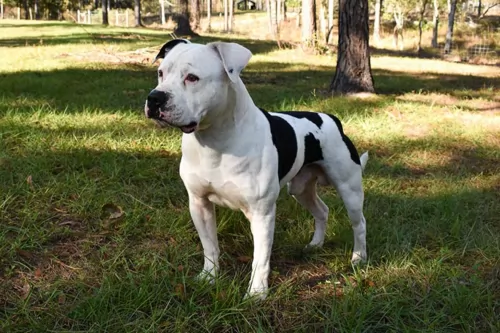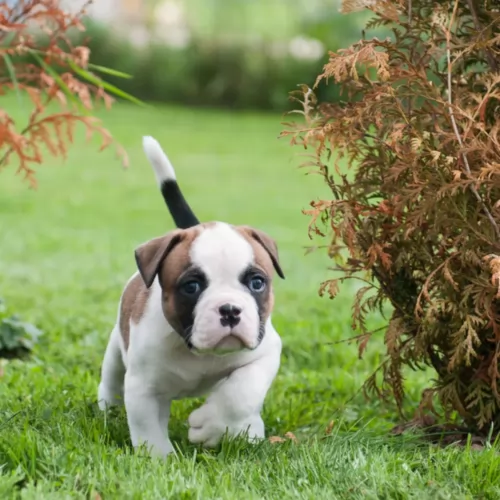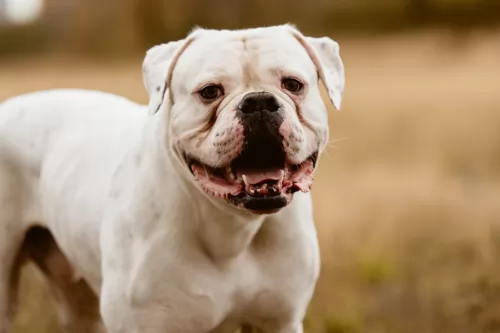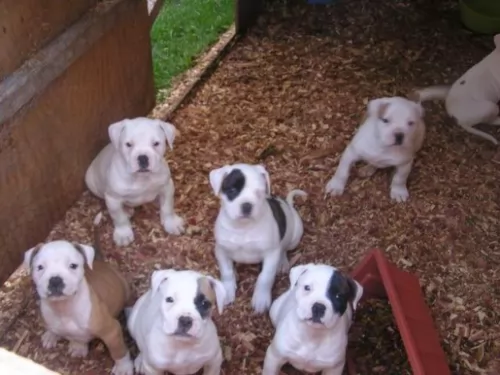 Petzlover
Petzlover American Bulldog is originated from United States but Old Danish Pointer is originated from Denmark. American Bulldog may grow 10 cm / 4 inches higher than Old Danish Pointer. American Bulldog may weigh 19 kg / 42 pounds more than Old Danish Pointer. Both American Bulldog and Old Danish Pointer has almost same life span. American Bulldog may have more litter size than Old Danish Pointer. Both American Bulldog and Old Danish Pointer requires Low Maintenance.
American Bulldog is originated from United States but Old Danish Pointer is originated from Denmark. American Bulldog may grow 10 cm / 4 inches higher than Old Danish Pointer. American Bulldog may weigh 19 kg / 42 pounds more than Old Danish Pointer. Both American Bulldog and Old Danish Pointer has almost same life span. American Bulldog may have more litter size than Old Danish Pointer. Both American Bulldog and Old Danish Pointer requires Low Maintenance.
 Following World War II, the American Bulldog was almost extinct.
Following World War II, the American Bulldog was almost extinct.
Thanks to John D. Johnson from Summerville, Georgia the breed is still with us today. He gathered the best dogs he could find throughout the rural South and bred them back into popularity among his family and other rural families. His father bred the American Bulldog before John did and they have bred them longer than any other in any part of the world. His dogs were regularly used for tracking, hunting, guarding, watchdog and weight pulling. At some point Alan Scott joined Johnson breeding other bulldogs to Johnson's and forming the Standard American Bulldog.
The American Bulldog/ is popular today as a family pet and companion as well as a working dog.
 Hailing from Denmark, the Old Danish Pointer originates back to 1710 and has been used as a pointing breed for finding game.
Hailing from Denmark, the Old Danish Pointer originates back to 1710 and has been used as a pointing breed for finding game.
Today they are essentially used as pet companions. Morten Bak mated local farm dogs with gypsy breeds, leading to the development of piebald purebred dogs. These were named Old Danish Pointers.
 The American Bulldog is a powerful and muscular dog in a sturdy and compact frame. The female is more refined than the heavy boned and stocky male, but both genders are athletic, agile and quick. The have large heads, strong jaws, a muscular neck and with a moderately deep and wide chest.
The American Bulldog is a powerful and muscular dog in a sturdy and compact frame. The female is more refined than the heavy boned and stocky male, but both genders are athletic, agile and quick. The have large heads, strong jaws, a muscular neck and with a moderately deep and wide chest.
They have a square head, with muscular cheeks and a clearly defined furrow between his eyes. With broad, square and strong muzzles, they have a reverse scissors, scissors, moderate underbite and an even bite. Ears come in a variety of shapes and sizes and eyes can be any color as well. The nose however should be black and lips black as well. Their legs are strong, heavy boned and straight with well-defined muscles in the hindquarters. Finally ,they have a thick, low set tail that comes to a point at the end.
 The Old Danish Pointer is a medium-sized, purebred dog standing at between 50 and 60cm in height and weighing between 26 and 35kg.
The Old Danish Pointer is a medium-sized, purebred dog standing at between 50 and 60cm in height and weighing between 26 and 35kg.
This beautiful dog is muscular and lean with a broad head, floppy ears and a long thin tail. The coat is smooth and short haired and is white with large reddish brown patches as well as some freckling.He is an average shedding dog.
He has dark brown eyes. He is amicable and gets on well with children in the home as well as with other dogs. Even so, it is best to have him trained and socialized as he becomes obedient and more amicable than he already is. If you decide to go in for breeding your dog, you can expect 4 to 6 puppies.
Quiet, calm and steady, the Danish Pointer is also stubborn, and this is why training and socialization is so important for him.
Outdoors and perhaps on a hunt he becomes highly animated and alive, but back home with his family he is a calm, loving, devoted family pet and loves spending time with his human family. He forms a close bond with his human owner and when he is well trained, he likes to please his owner.
He is intelligent too and finds learning new things easy.
 The American Bulldog is characteristically loyal, brave and reliable. It is a friendly, gentle dog that truly loves children. There is not a hostile bone in his body despite his history and reputation for bull baiting. Though he is protective of its family and affectionate with most, he still needs a human companion who is strong willed and a genuine pack leader. Without this he might become aggressive around other dogs and pets. They are immensely self-confident and they do slobber and drool and will become excited and hard to handle without daily exercise of both their body and their minds.
The American Bulldog is characteristically loyal, brave and reliable. It is a friendly, gentle dog that truly loves children. There is not a hostile bone in his body despite his history and reputation for bull baiting. Though he is protective of its family and affectionate with most, he still needs a human companion who is strong willed and a genuine pack leader. Without this he might become aggressive around other dogs and pets. They are immensely self-confident and they do slobber and drool and will become excited and hard to handle without daily exercise of both their body and their minds.
 Not only is the Old Danish Pointing Dog an excellent hunter, he is also friendly and loving when he is just being a pet.
Not only is the Old Danish Pointing Dog an excellent hunter, he is also friendly and loving when he is just being a pet.
These dogs are quiet, amicable pets enjoying the time they spend with their human family. He is low maintenance, he gets on well with children and other pets and he doesn’t spend his time barking endlessly at nothing.
When you take this well mannered, quiet, loving dog into your home, you can be prepared to have up to 14 brilliant years of companionship from him.
 Though generally healthy, the American Bulldog is prone to a few problems.
Though generally healthy, the American Bulldog is prone to a few problems.
This is a serious issue in many breeds of dogs and is especially prevalent with the American Bull Dog. This may seem ironic in such a short legged dog but it is unfortunately very common. It is a genetic disorder that causes the bones in the joint to separate and causes the dog much pain and lameness.
Due to skin folds you need to be care and watch for irritation and infection in the folds. They are also prone to ear infections.
The American Bulldog is prone to overeating and all the health issues that presents. With short legs and a genetic predisposition to arthritis and hip dysplasia, obesity is a real health risk for your bulldog.
 The Old Danish Pointer is a healthy dog and you’re not likely to be spending too much time at the vet with him.
The Old Danish Pointer is a healthy dog and you’re not likely to be spending too much time at the vet with him.
However there are always dog illnesses that you need to look out for, and hip dysplasia is always on the top of the list.
While this disease is more prevalent in larger dogs, it can strike smaller dogs too, and in fact dogs of any age. This is a condition where the hip joint doesn’t form properly, so that arthritis and inflammation sets in. It is very sad as you notice your once active dog becoming increasingly immobilized with pain and discomfort.
Eye infections can include entropion and ectropion – conditions where the eyelids irritate the surface of the eye.
Ear infections too, can cause your pet a lot of distress and he will shake his head and scratch his ears. Inside the ears, it will be red and possibly there will be a discharge. This is also more prevalent among dogs with floppy ears. The idea is to try and keep the inside of the ears clean and dry.
 With his short coat, the Old Danish Pointer is looked upon as a low maintenance breed. You can brush him twice a week and at the same time check him over for fleas and ticks, ear and eye infections as well as dental infections.
With his short coat, the Old Danish Pointer is looked upon as a low maintenance breed. You can brush him twice a week and at the same time check him over for fleas and ticks, ear and eye infections as well as dental infections.
Check his nails too, as many dogs have been injured when their long nails have hooked onto things and ripped open the flesh. When he gets used to it, your pet will find these grooming sessions therapeutic and relaxing, loving the bonding time you spend with him.
Your beautiful Old Danish Pointer loves to spend time outdoors and he is far better suited to life in the countryside and in the suburbs as opposed to life in the city. Give him the chance to take part in a hunt, and he’ll relish it. He also loves long walks where he can even perhaps be let off the leash as well as the chance to go swimming. He is at his happiest when he is tired at the end of the day from hiking, running, swimming and camping.
You can conveniently feed your Old Danish Pointer from the top quality commercially manufactured foods. Just be sure to check the labeling as you want to be sure he gets in the right amount of vitamins and minerals and avoids those foods high in colorants, preservatives and useless fillers.
Keep your dog’s diet simple and nutritious and try to add in some homemade food to his kibble from time to time. Boiled chicken, brown rice or pasta and some cooked vegetables such as sweet potatoes, spinach and carrots will keep him healthy and active. You can also try to include some raw meat occasionally.
Make sure he always has access to cool, fresh drinking water.